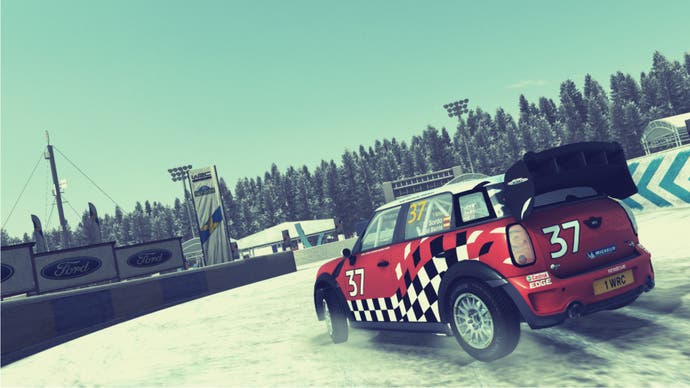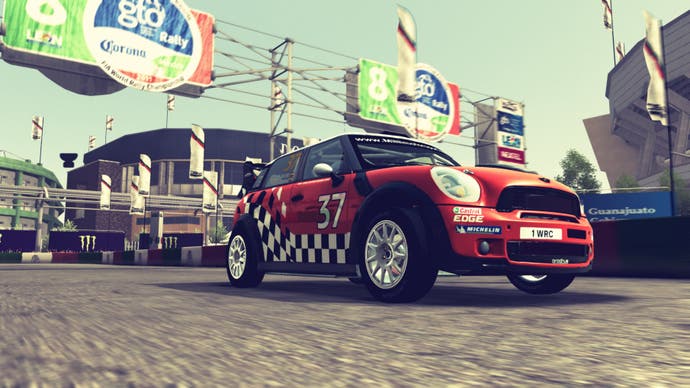WRC2 - FIA World Rally Championship
Point-to-pointless.
You'd think switching to a wheel would improve matters drastically, but you'd only be as half-right as Kimi Räikkönen's decision to try out rallying. Without having to tweak the settings there is noticeably more default rumble feedback on a Fanatec GT2 but, as with pad play, there's simply nowhere near as much communication from your vehicle as you'd want. You get the sense that the necessary detail is buried within the code, which a little tweaking would presumably exhume - not least because the car's behaviour is always in line with real-world expectations, and last year's model did display elements of realism. For 2011, however, everything has been dumbed down.
Combine this muted and disproportionately forgiving handling dynamic with a revised, excessively heightened sense of speed and the result makes Dirt seem like Richard Burns Rally. Although less noticeable during traditional rally stages, taking a WRC class car on Berlin's Urban Rally (a Special Stage inspired inner city track, with more promised to follow via DLC) looks like someone's pressed the fast-forward button. All that's missing is the Benny Hill theme.
So that leaves the improvements to the career mode. As with the original game, the goal is to work your way through the junior rallying ranks and get picked up by a WRC team. Where things alter considerably are in your ability to now hire a chief engineer and mechanics crew to R&D car parts - brakes, engine, gearbox, suspension, aero bits - which are normally ready to be implemented in your ever-growing garage after a rally event or two. Similarly, the curtailed sponsor dynamic of the first game gets reworked into a team manager who 'negotiates' (i.e. unlocks) new sponsor logos to stick on the panels of your car.

However, both of these elements adhere to Milestone's firm view on player progression. Access to better equipment and more income is double-locked behind skill and reputation level barriers, both of which evolve according to a strictly laid plan. The result is that the game opens up unevenly, with periods of disappointing inactivity with regards to the R&D and sponsor aspects, while the lack of variables within the structure (all the mechanics you can hire are essentially the same, for instance) removes the opportunity for individual strategic decisions. Progression doesn't feel organic but rather artificially calculated - you're effectively always playing WRC2 the way Milestone wants you to play it.
Still, in light of the game's facsimile approach elsewhere, it's a decent addition. As are other touches, such as the continual mixing of different rally classes regardless of which level you have reached - you still get to dabble in Group B and WRC '08-'10 events during the WRC tier, for instance. In lower classes, the diversity is more pronounced: R2, Debut, Production, S2000 and Safari are slotted in as you power through the cumbersome camber of Italian stages, tame the terrifying Catalonian tarmac, slither through sinuous Alsace or face ten other types of international road-based challenges.
But what's most frustrating is that there were really simple things which, regardless of production schedule, team size or budget, could have been fixed and which would have made the experience so much better. The menu progression is still unintuitive and clumsy, the overall experience is infuriatingly lifeless and lacks personality, there is a desperate need for a more relaxed approach to progression, and even the smallest of focused tune-ups to the handling feedback would have contributed to a greatly enhanced drive.

WRC 2 is a very slightly improved game, but a year on, gaming has left it behind. If you're new to the series, pick this one; like the original, despite its deficiencies, there is fun to be had if you allow yourself to be sucked in. But a sequel to a game with noticeable flaws that rolls up unashamedly unchanged can't be allowed to powerslide past unnoticed.
Like everything in life, video games must evolve, and assuming success is achieved by maintaining the status quo is both unrealistic and foolish. Just ask Sebastian Loeb.
